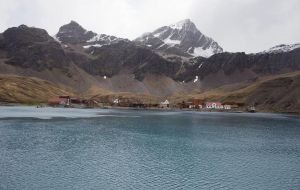MercoPress. South Atlantic News Agency
UK’s work on protecting the oceans has won deserved praise – now we must go further
 The review of the MPA designated within the waters surrounding South Georgia and South Sandwich Islands represents another globally significant opportunity
The review of the MPA designated within the waters surrounding South Georgia and South Sandwich Islands represents another globally significant opportunity By Matthew Offord MP for Hendon - UK leadership on ocean conservation has won international acclaim. The landmark “Blue Belt” policy to work with the UK Overseas Territories to “create the largest marine sanctuaries anywhere in the world” has only furthered this standing, with commitments to create large protected areas around Ascension Island and Tristan da Cunha in 2019 and 2020 respectively already widely welcomed.
Ahead of this, however, the 2018 review of the Marine Protected Area (MPA) designated within the waters surrounding South Georgia and the South Sandwich Islands represents another globally significant opportunity. The South Sandwich Islands represent a pristine environment, unscarred by historic whaling and sealing in comparison to neighboring South Georgia, and home to globally significant populations of penguins and whales. Current fishing activity around the South Sandwich Islands is limited to two vessels operating for one month a year. Campaigners such as the Great British Oceans coalition are therefore calling on the Government to seize the first Blue Belt milestone of this parliament and reclassify the South Sandwich Islands as a fully protected marine sanctuary, safeguarding some 500,000 square kilometers of Antarctic wilderness.
The UK Government need only gauge the widespread public awe currently greeting the BBC’s second Blue Planet series as a barometer for the popularity of such a measure. The UK has the fifth largest marine area of any nation, principally through the Overseas Territories, and is the privileged custodian to the world’s largest coral atoll and as many as a quarter of the world’s penguin population.
What is perhaps less appreciated, however, is how the Blue Belt and the UK’s wider efforts on ocean protection speak to two other areas in which the UK is acknowledged as a global leader.
The first is climate change. An increasing body of scientific evidence is pointing to the role of large fully protected MPAs in increasing the resilience and adaptability of marine ecosystems to climate change. Significantly for the UK, areas for which we are directly responsible could dramatically affect global understanding of climate impacts. The outermost limit of Antarctic winter sea-ice typically bisects the South Sandwich Islands, positing the potential marine sanctuary as not only globally significant for the wildlife it would protect, but in the contribution it could provide to our knowledge of the wider Southern Ocean as an area of scientific study. In the South Sandwich Islands, UK leadership on climate and the oceans can coalesce, with global significance.
The second area is in tackling modern slavery – a cause particularly close to the Prime Minister’s heart. The spectacular Blue Planet images currently gracing our screens may seem a world away from human rights abuses. However, the global community is increasingly coming to understand that illegal, unreported and unregulated (IUU) fishing poses a threat not only to the health of marine ecosystems protected by MPAs, but the ability of nations to safeguard their citizens. Indeed, a recent report by the Royal United Services Institute detailed how the global understanding of IUU has moved well beyond being simply an “environmental issue”: IUU is a highly organized transnational crime, costing the global economy as much as US$23 billion annually and increasingly understood to be synonymous with human and labor rights abuses
Catalyzed by the Blue Belt, the UK has led in not only designating MPAs but in also developing some of the technological advances – particularly in satellite platforms – required to effectively monitor MPAs from the threat of IUU. The FCO is already using this technology, based in Harwell at one of the Catapult centers, to monitor a number of Blue Belt sites, along with an increasing number of other governments and private sector companies. This UK-based technology is therefore helping to shine a light on the food, economic, and human security threats that must be addressed through greater custodianship of our oceans.
It is critical that implementation of the Blue Belt lives up to the promise of creating the “largest sanctuaries in the world”, beginning with the South Sandwich Islands in 2018. However, against a backdrop of “Global Britain”, the landmark Blue Belt speaks to other areas of UK leadership that we should be similarly unabashed about championing.




Top Comments
Disclaimer & comment rules-

-

-

Read all commentsComment removed by the editor.
Oct 30th, 2017 - 12:56 pm 0Because it relates to the South Sandwich Islands and South Georgia which are British Overerseas Territories. If you dont like it lump it.
Oct 30th, 2017 - 03:28 pm 0The question is why is this piece appearing in Mercopenguin, a British government propaganda organ supposedly devoted to America, South America and the “South Atlantic”?
Nov 01st, 2017 - 02:18 am 0Commenting for this story is now closed.
If you have a Facebook account, become a fan and comment on our Facebook Page!